English version of Turbulences interculturelles chez Air France-KLM: des employés témoignent
The other explanation for the current tensions
Air France-KLM has been in the news following the Dutch government’s acquisition of a stake in the company en 2019, bringing its share up to the level of that of the French government, respectively 14%. The political and economic stakes have been widely debated to denounce this “hostile method”, this “coup de force” or this “coup de Trafalgar”, according to commentators.
We are here in the great maneuvers that are played out in the upper levels. But aren’t these a consequence of more discreet, more daily, more trivial dysfunctions, which, unresolved year after year, erode the link between the French and the Dutch?
This is the question I asked myself when reading the many articles published on the subject. For I was surprised that no analyst referred to the difficulties that the French at Air France and the Dutch at KLM have had in working together for 15 years now (!), the merger having been celebrated in April 2004. These difficulties are documented. They were the subjects of an internal report that the Dutch media Een Vandaag leaked on 18 July 2017 in an article entitled Wantrouwen bedreigt voortbestaan Air France-KLM, or “Mistrust threatens the survival of Air France-KLM”.
The Guardian had echoed it. The French media had been rather discreet – see here the article that Europe 1 had devoted to it on July 20, 2017, quoting only the summary presented by the Guardian. In other words, no one in France seemed to have read this 110-page report (however in Dutch) or thought of having it translated. Neither have the last few days, when tensions between Air France and KLM have been exacerbated at the highest level.
The raw material for these experience feedbacks
As the report is still freely downloadable (here is the link, .docx format), I decided to get down to business by comparing and reviewing two translated versions, one by Google Translation, the other by Deepl, rereading and correcting sentence after sentence, using English and my memories of German, to offer a readable version.
The interest of this report is that it is essentially made up of remarks from 47 interviews conducted by Philippe d’Iribarne and Niels Noorderhaven between the end of January and the end of April 2017. It is therefore an exciting collection of feedback that provides insight into the challenges faced by the French and Dutch employees at Air France-KLM, but also into certain efforts to overcome misunderstandings and to enrich each other. You will find below a selection of excerpts organized according to eight topics, with a few comments from me.
Warning 1 – The proposed translations have no official value, they are solely my own and may be subject to approximations and errors.
Warning 2 – An experience feedback is always singular. It must be read with care, being the emanation of a subjective experience and individuality, with its lived experience, its character, its psychology. What interests us here is the recurrence of certain anecdotes, the frequency of certain experiences, as symptomatic of the cooperation between French and Dutch.
Warning 3 – The sharing of these remarks is not intended to denigrate Air France-KLM but to indicate the current challenges and to serve as very concrete material to identify levers for improving cooperation. In addition, I have chosen to end with excerpts that show a constructive relationship and open avenues for the future.
[PS – In 2015, a team of my students from the École des Ponts worked on the intercultural challenges between Air France and KLM. Their work (see here, in French) had been carried out before the company’s internal survey and deserves to be reread in the light of the 2017 report].
Here are the eight topics chosen for this selection of excerpts:
- “Things that annoy me a lot” – Relationship to hierarchy
- “They are extremely simple, sometimes even downright rude” – Communication
- “All kinds of people in a meeting who don’t say a word” – Meetings
- “The Dutch manager is much more transparent” – the skills of a manager
- “This is how the French were educated” – Appraisal
- “Less analysis, more action” – Reasoning, deciding, taking action
- “They’re just looking at the profits” – Values
- “What I really liked” – Reasons for hope?
* * *
1. “Things that really annoy me” – Relationship to hierarchy
The relationship to the hierarchy, marked by a greater or lesser distance between managers and subordinates, determines a very large part of managerial practices. When there is a strong hierarchical distance, behavior and communication vary according to status, and therefore modes of action. The remarks below are only from Dutch employees:
“The social culture in the Netherlands means that we tell the boss what we think. And here at Air France everything is arranged behind the scenes. And it’s very hierarchical. The boss is the enemy, whether it’s a good boss or a bad boss.”
“With my French subordinates, okay, we can understand each other, but the decision-making channels within Air France are more opaque, the consultation channels, the way to correctly inform the decision-maker, the CEO, is not clear. At KLM, hierarchical relationships are much shorter and it is less difficult to ‘cross’ hierarchical levels. If a Dutch person has something to say to his direct superior, he sends a copy to the latter.”
“Every once in a while, things happen that make me very angry. For example, in my previous position, I had done some research and organized a presentation. I had hoped to be able to present my research to senior management as well, but it wasn’t possible: my manager wanted to make my presentation, with a small contribution from me. […] This is something that happens at Air France, I don’t know how it happens with other French companies. You can only have your say when you are asked, a bit like a little child.”
“What I hear from KLM employees working in Paris is that if you make a critical remark in France about the boss’s decision, he immediately feels personally attacked, which is not at all the intention. For us it is more a question of knowing: have you thought it through? Ironically, it is rather a sign of loyalty on our part. Are you sure you want to do this?’: it’s not a question about you as a boss, but about the decision.”
It is surprising that, fifteen years after the merger between the two firms, the question of the relationship to hierarchy is still a problem, as if neither firm had been working on the subject at the time of the merger (which is not the case – see the last lines of this article). For this is the foundation of professional relationships, and a major explanation for certain tensions between the French and Dutch.
Yet all of this was foreseeable, and even predicted. See, for example, the title of an article in the Volkskrant published on October 1, 2003, when Jean-Cyril Spinetta and Leo van Wijk just signer the merger (translation in English: “KLM people have to get used to a huge hierarchical distance”):
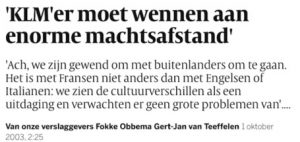
2. “They are extremely simple, sometimes even downright rude” – Communication
“It’s very strange that Air France managers didn’t even bother to learn how to say ‘hello’, ‘goodbye’ and ‘thank you’. That would make things a lot easier, because the balance is skewed.”
“It depends on the people I work with, some of them speak very good English, but I think they are a bit reluctant to speak. I think it’s very important to express yourself well in France. In the Netherlands we just say what we want, the form doesn’t matter. I think speaking is more of an art form here in France. You have a lot of words to express the right feeling, exactly what you want to say, and if someone is a good speaker in France, he often has a good image. In the Netherlands there are many, many people in high positions who speak Dutch terribly badly.”
“The Dutch are very direct, very sharp. They are extremely simple, sometimes even downright rude.”
“In public, the Dutch make strange remarks that can sometimes be perceived as direct attack. I’ve never experienced this in thirty years at Air France. That really doesn’t mean that the managers, employees and directors of Air France are all saints. However, they observe a certain distance to prevent offensive behavior. The Dutch, however, do not seem to be concerned about this issue at all. I think they don’t like to hurt others, they just don’t realize it.”
In France, we tend to consider the fact of speaking very directly, very explicitly, without toning things down, without putting in its message politeness, or humor, as a mark of authoritarianism, or of defiance to authority, specially when it is a subordinate who expresses him/herself in this way with his manager. On the Dutch side, it is simply the manifestation of sincerity, transparency, and honesty. In contrast, the Dutch will see indirect communication as a mark of insincerity.
Thus, the French may perceive the Dutch as aggressive, and the Dutch may judge the French as unreliable – whereas both would benefit from explaining to each other the values underlying their communication style, more implicit for the former, more explicit for the latter.
3. “All kinds of people in a meeting who don’t say a word” – Meetings
“The meetings with the French are disastrous. They don’t read the documents, they arrive late, and they have no discipline. It’s unprofessional, with two-hour meetings without adequate preparation. With no respect. Agenda items are omitted. As far as I know, this is their vision of life, but in business, it becomes very difficult to manage a team if you don’t know which way you want to go!”
“When there is an important meeting, the Dutch consult each other in advance. The Air France people don’t all appear at the same time, a little too late. Some have already read something, and others have not. They say ‘we will agree with each other during the meeting’. But the Dutch know exactly what they want and what they will say.”
“Everyone who attends a Dutch meeting has good reason to do so. With the French, there are all kinds of people in meetings who don’t say a word. For a Dutch person, it is very strange that all these people come to the meeting but don’t say a word. At the same time, the French find it annoying that every Dutch person wants to have a say in a meeting.”
The first two factors (divergence in the relationship to the hierarchy, differences in communication style) will be exacerbated in the dramaturgy of any meeting (theatrical representation of jobs in a unit of time, place and action). The cultural conflict is then triggered:
On the one hand, the French tend to give way to improvised ideas by valuing a form of debate under the influence of hierarchy: some feel obliged to be present simply to reinforce the status of their leader, and free speech is encouraged as if it were a counterweight to the decision that will be taken by the leader without basing it on consensus.
On the other hand, the Dutch organize a meeting before the meeting, in order to clarify a common position to be put forward and defended at the meeting with the French, which gives the latter the feeling that everything has already been discussed and that the meeting has no other purpose than to validate the Dutch positions.
4. “The Dutch manager is much more transparent” – The skills of a manager
“A manager at Air France is above all an expert in his field, who became a manager after a while. At KLM, the manager is more of a leader who relies on experts. My colleague manager at KLM never contradicts the technical recommendations made under his responsibility by the Dutch experts he relies on. In the baggage department or in the sales department, there is a manager with a degree in psychology. He coordinates and does the planning. He has no authoritative function.”
“Air France’s French managers have an extremely hierarchical culture and delegate little. A good manager at Air France is someone who has never made a mistake, who is a bit clever. I think a good manager should be judged on his ability to learn from mistakes, his desire to innovate and the growth of his team. Air France doesn’t attach much importance to that, and I think that surprises a lot of Dutchmen. Air France managers have to lock everything up so that nothing gets to their boss, so that they can say that everything is going well. The Dutch manager is much more transparent, and this kind of behavior is disconcerting and unpleasant for the Dutch.”
“KLM employees are more enterprising and independent. As a manager, you really need to tell Air France staff what to do; otherwise they will wait for you to do it.”
“Air France managers are promoted on the basis of seniority, knowledge and skills, while at KLM they have more general management skills.”
We can see that Air France is still very much influenced by the “traditional” conceptions of French management when employee put the emphasis on expertise as a skill of a good manager, as well as his/her so-called infallibility, hence the difficulty in admitting mistakes or pointing out his or her own errors. The Dutch manager will not necessarily be the expert of his/her team, but the facilitator.
Twenty years ago, when managers from different countries were asked if it was important for them to have answers to most of the questions their subordinates might raise about their work, 59% of them answered positively, compared to 13% of American managers (see Working with the French – feedback from the field).
However, there is one very obvious lever that could be used to bring the French and Dutch together: to disseminate airline pilots’ managerial skills internally. The safety culture requires them to have a moderate hierarchical distance, leadership based on setting an example and not on authoritarianism, explicit but non-aggressive communication, a sense of listening and consultation, humility and an ability to point out errors. These are all skills that are already strongly present in the company and should be taken as the center of gravity for managerial qualities at all levels of Air France-KLM, and not only for the pilots.
5. “This is how the French were educated” – Appraisal
The time of evaluation often awakens bad memories in the French. Who doesn’t relive the pathetic scene where a teacher returns the papers in ascending order, from the worst grade to the best? Who does not remember a hurtful oral remark or a large red line on an assignment? As an anecdote, I haven’t forgotten that music class in college where, unable to sing a note (an “A”) played on the piano by the teacher, the latter made me (vainly) repeat it about twenty times standing in front of the class, which is certainly an excellent way to make the subject you teach in this way detestable.
“In the Netherlands, things are very structured. During your appraisal interview you have to formulate your objectives. You write down your objectives, and the following year you evaluate your objectives and have a meeting about your progress: ‘Tell me, how are you progressing? Can we make a few improvements here and there?’ A few months ago, I told my French manager: ‘I still don’t have any objectives for 2016. Shouldn’t they be written down, should I make a proposal? – No, it’s going to happen.’ And finally, at the end of the year, I still didn’t have my objectives. I wonder what we’re going to talk about tomorrow, because officially I don’t have any goals, you know.”
“For us Dutch people, appraisal is much more than just an evaluation: it is a form of appreciation. With my French manager, my appraisal interview lasted twenty minutes, and he told me what I wasn’t doing well instead of saying what I was doing well. It was a very negative experience. Later, I understood where it came from, it came from the school: Give the right answer, yes or no. For us, it’s: You did your best, very well, but next time you can say this or that.”
“There are also differences in the appraisal of individuals. I ask my managers and direct reports to write their own evaluation and describe what they did. This is not done in France.”
“This is how the French were educated: they are not allowed to make mistakes, they always want to get the best grade.”
In contrast to a top-down conception of appraisal where, on the French side, the person being evaluated is controlled by his evaluator, the Dutch employee is accompanied by the evaluator in order to make better progress towards the objectives. On the one hand, progress is made by highlighting what is not going well (the glass is half empty) because it is by being aware of the shortcomings that we will know what needs to be filled; on the other, progress is made by knowing what is going well (the glass is half full) because it is the progress that is being made that will herald the progress to come.
There is no ideal method; each one has its strengths and weaknesses. But without explaining the strengths of each of them and without defining a common method, the discomfort will intensify. However, taking up the image of the half-filled glass, one could imagine a collaborative work where the evaluator and the evaluator comment together on the two parts: the empty and the full, indicating for each of the subjects concerning the empty the concrete means to remedy it and, for the subjects related to the full, the good practices and feedback from which other collaborators could benefit.
As indicated by a Dutch employee, one has to refer to the respective educational systems to understand where such a difference in approach comes from. If French and Dutch people could explain how they were educated from early childhood, they would understand each other much better. This is a work I do regularly in workshops or with my students (see on this blog Education systems: essential keys to understanding cultural differences).
6. “Less analysis, more action” – Reasoning, deciding, taking action
How to think, reflect, reason, argue, convince, decide, and take action? The process is not as linear as it seems when it is described in this way, which can give rise between certain stages to back and forth (when we move from the decision made to a new phase of reflection) or to overlapping between certain stages (when we continue to argue while acting because the commitment of some people can only be gained by convincing them as we go along).
Moreover, each of the stages of the process can be triggered in its form and content in a different way according to the personality of the initiator, his professional culture and also according to the influence of national preferences or habits which, in this aspect, will be very much linked to the educational system of the country in question.
“We never see a conflict of ideas among the Dutch in a meeting, really, very rarely. The French will propose things like: what is the definition of a good idea? It’s the ability to formulate it with certain elegance in a well thought-out conceptual framework, with many details. And because there is a lot of ego in a meeting, there is a kind of rivalry in the field of ideas, and the French always have a hard time showing solidarity, which is a huge cause of frustration between Air France and KLM, because for every KLM idea, all KLM employees support it. At Air France, people each have an idea, and then they go and discuss it.”
“I think the French like to exchange ideas during a meeting. For a Dutchman, it’s almost philosophical. You exchange all kinds of ideas and you learn a lot about all kinds of subjects, but in the end, a Dutch person just wants to know what to do after such a meeting. He wants a list of decisions he can work from. For the French, the whole process, from A to Z until the final decision, is an organic process in which you can do everything completely differently at each step. It is difficult for a Dutch person to follow such a method.”
A Dutch employee: “Facts, facts, open debate and a voluntary attitude would help us enormously. Make it possible to discuss things as they really are.”
“I see a big difference between Air France and KLM in terms of the speed with which ideas spread. When there is an idea at KLM, they do everything necessary to realize it, at all costs, even if they risk making the wrong choice, whereas at Air France, they first think in depth, take a step back, do studies, etc., and then they take the next step.”
“There is a difference in the behavior of teams compared to managers. The Dutch have much less difficulty questioning the decision as long as it has not yet been made, questioning it or debating it, whereas the French are more reticent. On the other hand, once the decision has been made, they will join forces in a very pragmatic way. A Frenchman will remain a little in the area of consultation.”
“I also think that we in the Netherlands do more testing and then make small adjustments. Less analysis; more action.”
“We are much more willing to take risks. If something in a project is not fully prepared, then we say we’re going to do it anyway and then we control the risk. The French, on the other hand, wait another two years. At KLM, we often use the 80/20 rule: we start when we have done 80% of the preparatory work, flexibly and with trials and errors.”
We find here an important difference between the French who separate theory and practice, so that the practical dimension is not initiated until the theoretical part is fully explored, and the Dutch who favor an experimental approach without waiting to have a global vision in terms of analysis. It should be noted that this global vision takes time and delays the French; however, foreigners who work with us may appreciate it because, in this way, we never lose sight of the complex whole of the project.
To a certain extent, the Dutch way of working, where facts, experience and action prevail, would find more echoes with that found in the United States or Japan. It is important to note here that geographical proximity does not necessarily mean cultural or intellectual proximity. I refer here to the article of this blog The French and the demon of theory: 3 stories.
7. “They are just looking at the profits” – Values
The French dictionary Le Robert defines the notion of value as follows: “the quality of what is subjectively estimated and set as objectively estimable”. In other words, value sheds light on certain singular choices made by an individual in the light of their recognition by the community with which he or she identifies. When they are linked to values, my preferences or my refusals are no longer entirely mine. They then depend on internalized social norms.
Some remarks by French and Dutch people refer to antagonistic values, or at least values that are difficult to reconcile. One then wonders about the absence of a common corporate culture that would overcome these differences by proposing a common frame of reference.
“The French do not make decisions for profit, but for the continuity of work.”
“When we talk about the Dutch, we’re talking about the way they do business all the time, they just look at the profits, they don’t work the way we do.”
“At KLM, we are witnessing a kind of American mentality: efficiency, productivity, business sense, costs, and so on. I think that, on the French side, they seem to pursue the same objectives in a rational way, but they mainly concern social aspects and employment. Efficiency and commercial clear-mindedness are not always accepted.”
A Dutchman: “I have read press articles, for example on trade unions. It is often written: Us, workers! or: Us, workers against management! It is essentially the people against the king. It’s a bit like that. A tradition with which we have little to do with.”
French and Dutch do not share the same worldview. The Dutch are astonished by the conflicting view that the French have of their relationship with the company’s management, a view made even more evident during the now famous shirt ripping of Air France’s HR Director, Xavier Broseta, on October 5, 2015:
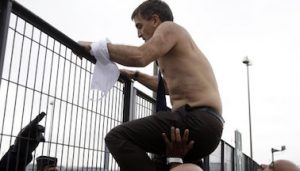
The French, for their part, undestand Dutch utilitarianism, the principle according to which what is useful is what is right, by reducing it to what is financially efficient, rapidly profitable and remunerative. The human link is then, in their eyes, subordinate to economic links, which is opposed to their conception according to which it is the quality of human links and their solidity in the long term that will lead to economic results. As one KLM employee put it, French and Dutch people “seem to pursue the same objectives” – but not in the same way.
8. “What I really liked” – Reasons for hope?
The 110-page report also includes several remarks attesting to a positive, more constructive relationship, giving a glimpse of what cooperation between French and Dutch people could be like if the company were to spread a true cross-cultural culture internally.
“The collaboration with my French colleague is fantastic. I am very happy with it. The collaborations I have and have had with other French people have also been very pleasant.”
“What I really liked was the direct feedback I received. That way, I could adapt quickly and become a better manager. It works differently at Air France. The Dutch tell me things that I would never tell my boss myself. It’s really a Dutch trait they can be proud of.”
“The Dutch have taught me discipline and how to approach problems directly, very concretely and reactively.”
A Dutchman: “I think they are quite hierarchical, but I really have a lot of freedom in my work. I often have to be in Brussels or Amsterdam, and if I have to go somewhere, I go, because my boss trusts me and thinks that if I have to go somewhere, I go for professional reasons, not just for my pleasure.”
“I think French managers are always very attentive when you present an idea, there is no French manager who is not open to discussion when you present an idea.”
A Frenchman: “What we have learned from them is clearly pragmatism, we go for it, even with the risk of having to change direction later and say: we were wrong, we tried and we were wrong, that’s something we learned.”
“What I learned from them is that it’s all about developing documents in advance, disseminating them and making concrete decisions at meetings. That’s a plus, I think.”
“We are developing in a Dutch way. We learn by trial and error, accept that things go wrong, experiment, and if that doesn’t work, draw conclusions and go further, it hasn’t happened in the Air France culture for five or ten years.”
“Where we can learn a lot from our colleagues is in the commercial field: how to sell and convince people that you are offering them something they never thought of before, something they really need. We, with our more scientific approach, demonstrate this more by A+B. Let’s wrap it up a bit, tell a story, and then we’ll convince more easily.”
Some Dutch employees find in the French autonomy, confidence, listening to ideas, openness to discussion, while some French draw inspiration from the pragmatism of their KLM colleagues, end up appreciating their unambiguous communication, learn to be free of guilt about mistakes and to be more efficient in terms of sales.
However, it seems that these stories come from singular experiences, and not from an internally formalized project to enrich each other by capitalizing on each other’s strengths. However, the French magazine Capital states that at the beginning of the merger “seventy bi-national working groups, involving the 1000 main executives of the new entity, travelled back and forth between Paris and Amsterdam” to identify common synergies. A fundamental work was therefore carried out, with the bosses of Air France and KLM having “given their full backing to cross-cultural training”.
The question then arises: have these efforts been nothing more than a flash in the pan? What obstacles did they encounter internally to allow misunderstandings to persist fifteen years after the merger? Is it because, by definition, an airline is strongly rooted in a national identity and interests (Air France bears the name and colors of its country of origin, KLM has the royal crown on its logo) that would prevent cultural rapprochement with a foreign company? Or is it because of an inability to develop internally profiles that demonstrate real intercultural skills that could benefit the entire company?
Quelques suggestions de lecture:
- Working with the French: Indians share their experiences
- Working with the French: 17 foreigners from 12 countries share their experiences
- Working with the French: 22 foreigners from 19 countries share their experiences
- Working with the French – feedback from the field
- When details are monumental – 4 cross-cultural edifying stories
- The surprise effect, or the enemy of cross-cultural communication
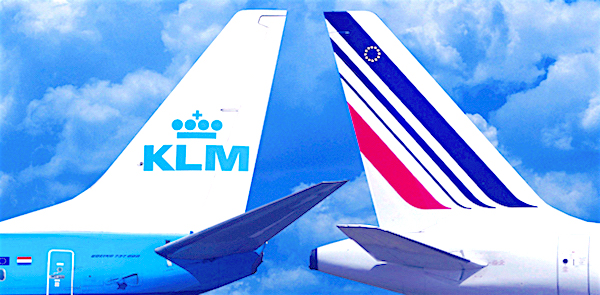
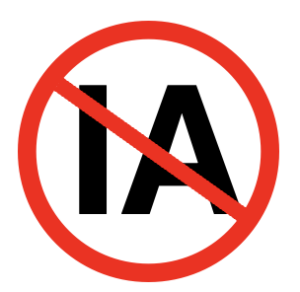
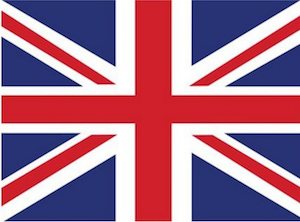
Derniers commentaires